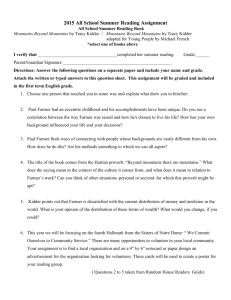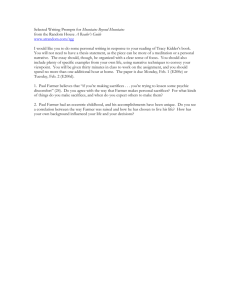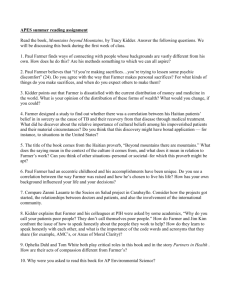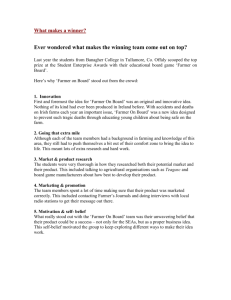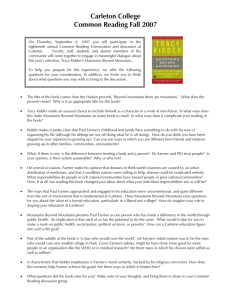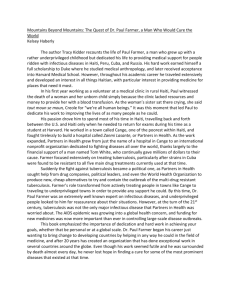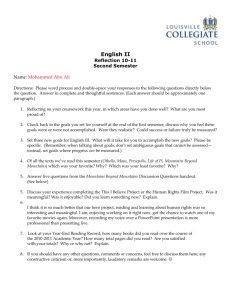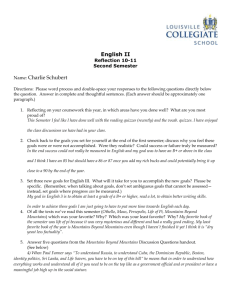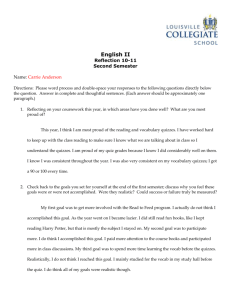MOUNTAINS BEYOND MOUNTAINS
advertisement
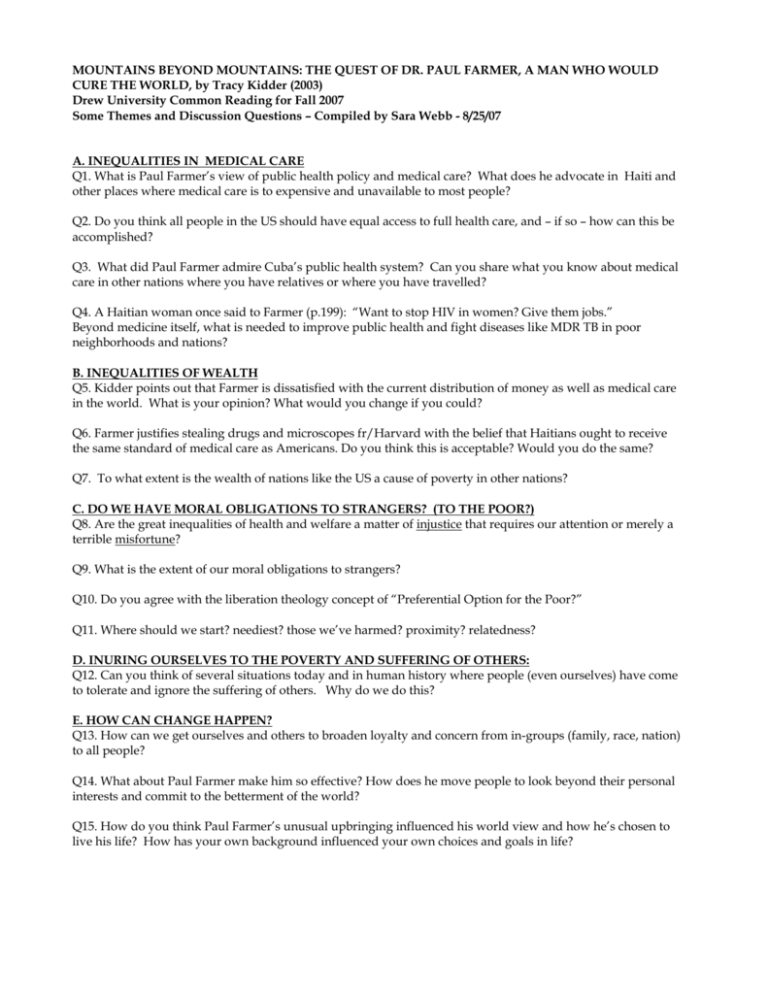
MOUNTAINS BEYOND MOUNTAINS: THE QUEST OF DR. PAUL FARMER, A MAN WHO WOULD CURE THE WORLD, by Tracy Kidder (2003) Drew University Common Reading for Fall 2007 Some Themes and Discussion Questions – Compiled by Sara Webb - 8/25/07 A. INEQUALITIES IN MEDICAL CARE Q1. What is Paul Farmer’s view of public health policy and medical care? What does he advocate in Haiti and other places where medical care is to expensive and unavailable to most people? Q2. Do you think all people in the US should have equal access to full health care, and – if so – how can this be accomplished? Q3. What did Paul Farmer admire Cuba’s public health system? Can you share what you know about medical care in other nations where you have relatives or where you have travelled? Q4. A Haitian woman once said to Farmer (p.199): “Want to stop HIV in women? Give them jobs.” Beyond medicine itself, what is needed to improve public health and fight diseases like MDR TB in poor neighborhoods and nations? B. INEQUALITIES OF WEALTH Q5. Kidder points out that Farmer is dissatisfied with the current distribution of money as well as medical care in the world. What is your opinion? What would you change if you could? Q6. Farmer justifies stealing drugs and microscopes fr/Harvard with the belief that Haitians ought to receive the same standard of medical care as Americans. Do you think this is acceptable? Would you do the same? Q7. To what extent is the wealth of nations like the US a cause of poverty in other nations? C. DO WE HAVE MORAL OBLIGATIONS TO STRANGERS? (TO THE POOR?) Q8. Are the great inequalities of health and welfare a matter of injustice that requires our attention or merely a terrible misfortune? Q9. What is the extent of our moral obligations to strangers? Q10. Do you agree with the liberation theology concept of “Preferential Option for the Poor?” Q11. Where should we start? neediest? those we’ve harmed? proximity? relatedness? D. INURING OURSELVES TO THE POVERTY AND SUFFERING OF OTHERS: Q12. Can you think of several situations today and in human history where people (even ourselves) have come to tolerate and ignore the suffering of others. Why do we do this? E. HOW CAN CHANGE HAPPEN? Q13. How can we get ourselves and others to broaden loyalty and concern from in-groups (family, race, nation) to all people? Q14. What about Paul Farmer make him so effective? How does he move people to look beyond their personal interests and commit to the betterment of the world? Q15. How do you think Paul Farmer’s unusual upbringing influenced his world view and how he’s chosen to live his life? How has your own background influenced your own choices and goals in life? Q16. Many people feel helpless to make a difference in the world. On the other hand is the famous quote by anthropologist Margaret Mead: “Never underestimate the ability of a small group of committed individuals to change the world.” Can you think of cases where one individual or one small group has effected important humanitarian change for the better? Q17. Farmer is an anthropologist as well as a physician. What did he discover about the relationship between beliefs in sorcery and modern medicine in Haiti? Can you think of other examples where cultural understanding can improve medical care? F. COST-EFFECTIVENESS, AND FEASIBLITY IN MEDICINE Q18. Farmer insists on seeing patients and spending mega-bucks to save individual lives, while some argue that it would be more cost-effective for him to focus on the big picture, given his leadership skills, and it can be argued that more people could be saved if those dollars were spent differently. Do you think Farmer is in error? What’s the connection between his work with individual patients and his broader mission to the poor? G. THE BOOK ITSELF: Q19. MBM is extremely readable for a work of nonfiction. How does the author accomplish this? Q20. The book: Kidder has said that point of view s the most important choice and author makes in constructing a work of narrative non-fiction. Kidder has never before written a book in which he made himself a character. Can you think of reasons for doing so in MBM? Q21. Why do you think the book begins and end as it does: beginning with a conversation with a US army captain as he leaves Haiti and ending with the story of John, the Haitian boy airlifted to Boston for treatment of his cancer? H. GENERAL/PERSONAL QUESTIONS: Q22. The book title comes from the proverb “Beyond mountains there are mountains.” What does this saying mean in context of Haiti’s culture? How does it relate to Farmer’s work? Can you think of other situations – personal or societal – for which this proverb might be apt? What have been your experiences with mountains? Do they have a spiritual dimension for you? Q23. What do you think you learned from the book – about Haiti, about global medical care, about Paul Farmer, about yourself?
